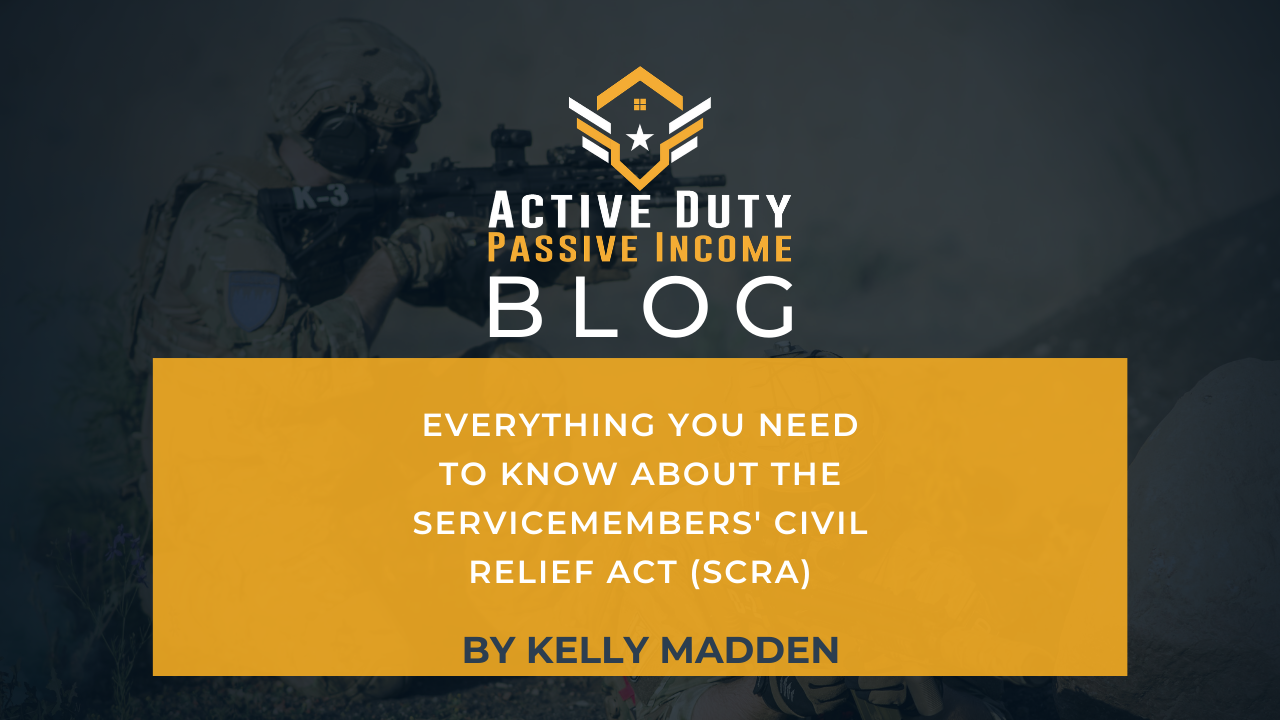What is the Servicemembers Civil Relief Act?
As an active duty service member, it’s important to know your benefits. One of these important benefits is the Servicemembers’ Civil Relief Act. SCRA is a federal law that limits actions against service members while they serve on Active Duty. Some topics that SCRA covers are:
• Rental agreements
• Security Deposits
• Prepaid Rent
• Eviction
• Installment Contracts
• Credit Card Interest Rates
• Automobile Leases
• Mortgage Interest Rates
• Mortgage Foreclosure
• Civil Judicial Proceedings
• Income Tax Payments
• Small Business Owner Protections
When am I Eligible for the Servicemembers’ Civil Relief Act?
Servicemembers’ SCRA benefits start on the date your active duty orders are received and typically ends within 30-90 days after your date of discharge from active duty. If you’re Reserve or National Guard, SCRA only applies when you’re serving on active duty orders.
There are limited situations where dependents (spouses and children) can receive SCRA protections. If you have questions about eligibility, be sure to contact your base legal office.
You can also request your records from DOD to determine your eligibility.
Servicemembers’ Civil Relief Act Benefits
- Loans – SCRA limits interest rates to 6% on all loans taken out before joining the military – including mortgages, credit cards, auto loans, etc. The reduced rate can extend for one year after active military service ends.
- Life Insurance – your life insurance policy is protected against lapse, termination, forfeiture for nonpayment of premiums for the entire length of service and for two years after you leave service.
- Mortgages – SCRA can protect you against foreclosure if you meet the following requirements:
-
- A mortgage is on real/personal property.
- Mortgage payments started before you entered active duty.
- The property was owned by you or a family member prior to active duty.
- Your ability to pay the mortgage is materially affected by your military service.
- Once all of these requirements are met, the lender must get a court order before they can foreclose on your property. If you’re having trouble making mortgage payments, immediately contact your legal assistance office for guidance.
- Taxation – SCRA can prevent you from double taxation that can occur if your spouse works in state and has a permanent legal residence in another. It also can stop states from using your income to determine your spouse’s tax rate when you possess a legal residence in another state. With SCRA, a spouse claims the same state of legal residence as their partner for state taxes. On the opposite side, spouses can claim the state they are living in as their taxable state or possibly the state of legal residence they claimed before marriage.
- Default Judgment Protection – If (while on active duty), a civil action, proceeding or administrative proceeding is filed, a lawyer must be appointed to represent you in your absence. The court will then grant a stay (delay) of at least 90 days if it is determined that there may be a defense to the suit and your attendance is required.
- Residential Lease Termination – SCRA can help with terminating residential leases and other leases (agricultural, professional, and business). This applies if you entered a lease before beginning active duty, received PCS orders, or if you’re deploying with a military unit/operation for more than 90 days. To terminate, written notice of termination and a copy of orders must be hand-delivered or by return-receipt mail to the property owner.
- Small-Business Owners Protection – If you own a small business, SCRA protects your nonbusiness assets and military pay from creditors while you’re on active service. This is specifically for business debts or obligations.
SCRA can give you options while on active duty service and after your service has ended. To make sure you’re using your benefits properly, always contact your legal assistance office – they will be able to tell you how to get the most out of your benefits!







